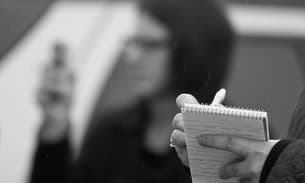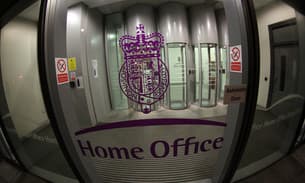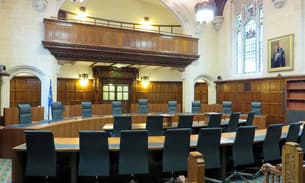QC: RIPA codes of practice will not protect journalists from police surveillance
Reporter’s notebook by Roger H Goun at Flickr
Nothing short of a change in the law will do if journalists’ sources are to be properly protected from covert surveillance according to a leading human rights lawyer.
Proposed new codes of practice on surveillance, outlining additional protections for journalists, are due to be published by the Home Office before Christmas.
But Gavin Millar QC says police are accessing journalists’ phone records and other details about their communications far too easily and that only “black letter law” will suffice to change police attitudes.
Speaking last Sunday at a conference on surveillance, he said: “The police feel that the end justifies the means. They have realised in recent years that journalists hold large amounts of digital data.”
Officers have been allowed to gain access to that data covertly by what Millar describes as “loose procedures” laid down under the Regulation of Investigatory Powers Act 2000 (RIPA), which governs surveillance by the police, the intelligence services and other government authorities.
“[The police] view is that this easy access is helpful and useful and justified in the fight against crime – not necessarily serious crime,” Millar told delegates at the Logan Symposium on December 7.
The police will not give up this access easily, he added.
Millar called for a “shield law” in relation to material that may identify journalists’ sources.
He recommends legislation that would force officers to apply to judges before using their surveillance powers against journalists and require them to keep proper records of when this occurs.
Under RIPA, detectives do not need a judicial warrant to spy on journalists’ communications: authorisation by an officer within the same police force at superintendent level or above is sufficient.
A political motivation is evident in two high-profile examples of police use of telecoms data to identify journalistic sources, Miller said.
The Metropolitan Police accessed the phone records of the Sun newspaper’s political editor Tom Newton Dunn to find the source of leaks about the “Plebgate” affair involving the then Tory chief whip Andrew Mitchell.
Kent Police did the same to a Mail on Sunday reporter in a bid to identify who was leaking information relating to the investigation into whether former cabinet minister Chris Huhne had lied about who was driving a car when it was ticketed for speeding.
Millar believes this type of access to journalists’ records is widespread.
Met police chief Sir Bernard Hogan-Howe has sought to justify the spying by claiming that Newton Dunn was suspected of committing a crime.
The Sun is bringing a case before the Investigatory Powers Tribunal, which investigates complaints about surveillance by the police and intelligence agencies.
Millar is acting for the Bureau of Investigative Journalism in its challenge to the UK government’s surveillance regime at the European Court of Human Rights.
The Bureau is seeking a declaration that RIPA is incompatible with Article 10 of the European Convention on Human Rights, which requires protection of journalists’ sources.
Meanwhile an influential committee of MPs has said RIPA is not fit for purpose.
In a report published on December 3, the Commons Home Affairs Committee raised concerns that the current regime allowed police to “engage in acts which would be unacceptable in a democracy, with inadequate oversight”.
But while the committee noted that journalists’ sources had been targeted in the two cases involving the former cabinet ministers, it stopped short of calling for a change in the law to protect the press.
Instead it asked that the updated code of practice contain “special provisions for dealing with privileged information, such as journalistic material.”




